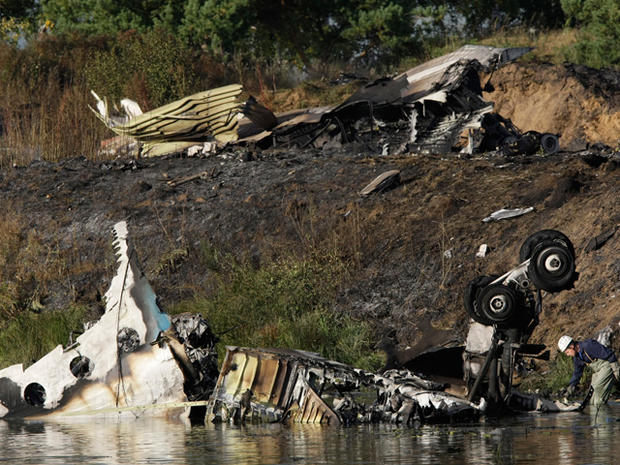Pilots blamed for crash that killed hockey team
MOSCOW - A Russian jet crash that killed 44 people, including an entire professional ice hockey team, was caused by pilots inadvertently putting on the brakes during takeoff, investigators said Wednesday, blaming poor crew training and lax oversight.
The Interstate Aviation Committee said the Sept. 7 crash of the Yak-42 plane near the city of Yaroslavl in central Russia occurred because one of the pilots accidentally activated the brakes during takeoff and then pulled the plane up too sharply in a desperate attempt to take off.
Russia jet crash kills 44, many top hockey stars
Team tragedies: A glance at plane crashes in the sports world
It was one of the worst aviation disasters ever in sports, shocking Russia and the world of hockey, as the dead included 36 players, coaches and staff of the Lokomotiv Yaroslavl hockey team. The only player who survived the crash later died of burns. A flight engineer was the sole survivor.
Alexei Morozov, who led the investigation, said the crew still had enough time to abort the takeoff safely at the moment when they realized that it had gone wrong.
He blamed the plane's owner, Yak-Service, for failing to observe safety standards and adequately train the crew. The company was closed in September by Russia's federal aviation authority following a check that found severe violations.
"The company practically lacked a proper system of flight oversight and controls over air safety," Morozov said.
Morozov said that both pilots had flown another type of plane with a slightly different cockpit layout and apparently had never learned the correct position for their feet on takeoff. He said in the Yak-42, like virtually all other existing Russian and Western planes, a pilot steers the aircraft by pressing the lower part of pedals and activates the brakes by pressing their upper part.
But instead of putting their heels on the cockpit floor as regulations require, the crew left their feet resting on the pedals, inadvertently activating the brakes and slowing the plane down on takeoff. They at first didn't notice they were putting on the brakes, and then made the fatal mistake of failing to abort the takeoff, he said.
Morozov added that a medical condition of the second pilot, and the prohibited medicine he had taken contributed to the disaster. He said the pilot's illness had passed unnoticed during an official medical certification, but had been diagnosed by private doctors whom the pilot had consulted on his own initiative.
The plane was already past half of the long, 3,000-meter (9,900 feet) runway, when the crew tried and failed to lift it. They then weighed on the steering wheel trying to lift the plane and at the same time applied even more pressure on the brakes.
The jet sped past the runway and ran 400 meters (1,320 feet) onto the grass before finally taking off. It went up so sharply that it banked on its wing and crashed on the side of the Volga River, 150 miles (240 kilometers) northeast of Moscow.
The team had been heading to Minsk, Belarus, to play its opening game of the Kontinental Hockey League season.
Among the dead were Lokomotiv coach and National Hockey League veteran Brad McCrimmon, a Canadian; assistant coach Alexander Karpovtsev, one of the first Russians to have his name etched on the Stanley Cup as a member of the New York Rangers; and Pavol Demitra, who played for the St. Louis Blues and the Vancouver Canucks and was the Slovakian national team captain.
Other standouts killed were Czech players Josef Vasicek, Karel Rachunek and Jan Marek, Swedish goalie Stefan Liv, Latvian defenseman Karlis Skrastins and defenseman Ruslan Salei of Belarus.
The crash raised new concerns about Russia's aviation safety and prompted the president to suggest replacing all aging Soviet-era aircraft with Western-made planes.
But industry experts say that recent air disasters have been rooted not simply in planes' age, but in a combination of other factors, including insufficient crew training, crumbling airports, lax government control and widespread neglect of safety in the pursuit of profits.
